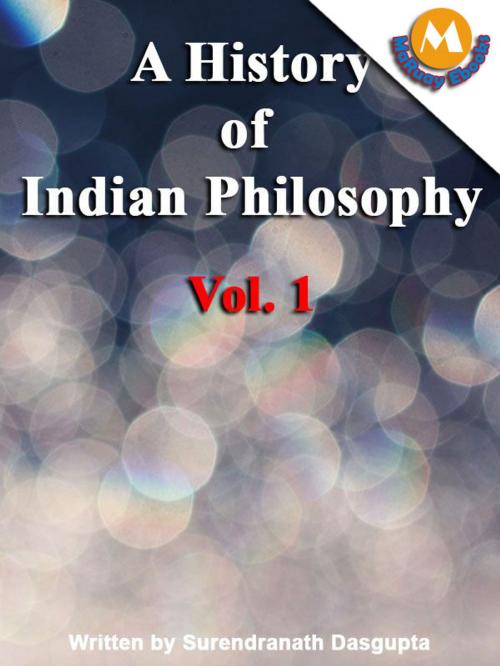| Author: | Surendranath dasgupta | ISBN: | 1230000126153 |
| Publisher: | Maruay Ebooks | Publication: | April 19, 2013 |
| Imprint: | Language: | English |
| Author: | Surendranath dasgupta |
| ISBN: | 1230000126153 |
| Publisher: | Maruay Ebooks |
| Publication: | April 19, 2013 |
| Imprint: | |
| Language: | English |
A history of Indian philosoph by Surendranath dasgupta
-This ebook Included TOC for Reader.
-This sample in this ebook ;
process of development and they were probably regarded as parts of one literature, in spite of the differences in their subject-matter. Deussen supposes that the principle of this division was to be found in this, that the Brâhma@nas were intended for the householders, the Âra@nyakas for those who in their old age withdrew into the solitude of the forests and the Upani@sads for those who renounced the world to attain ultimate salvation by meditation. Whatever might be said about these literary classifications the ancient philosophers of India looked upon the Upani@sads as being of an entirely different type from the rest of the Vedic literature as dictating the path of knowledge (jñâna-mârga) as opposed to the path of works (karma-mârga) which forms the content of the latter. It is not out of place here to mention that the orthodox Hindu view holds that whatever may be written in the Veda is to be interpreted as commandments to perform certain actions (vidhi) or prohibitions against committing certain others (ni@sedha). Even the stories or episodes are to be so interpreted that the real objects of their insertion might appear as only to praise the performance of the commandments and to blame the commission of the prohibitions. No person has any right to argue why any particular Vedic commandment is to be followed, for no reason can ever discover that, and it is only because reason fails to find out why a certain Vedic act leads to a certain effect that the Vedas have been revealed as commandments and prohibitions to show the true path of happiness. The Vedic teaching belongs therefore to that of the Karma-mârga or the performance of Vedic duties of sacrifice, etc. The Upani@sads however do not require the performance of any action, but only reveal the ultimate truth and reality, a knowledge of which at once emancipates a man. Readers of Hindu philosophy are aware that there is a very strong controversy on this point between the adherents of the Vedânta (Upani@sads) and those of the Veda. For the latter seek in analogy to the other parts of the Vedic literature to establish the principle that the Upani@sads should not be regarded as an exception, but that they should also be so interpreted that they might also be held out as commending the performance of duties; but the former dissociate the Upani@sads from the rest of the Vedic literature and assert that they do not make the slightest reference to any Vedic duties, but only delineate the ultimate reality which reveals the highest knowledge in the minds of the deserving.
A history of Indian philosoph by Surendranath dasgupta
-This ebook Included TOC for Reader.
-This sample in this ebook ;
process of development and they were probably regarded as parts of one literature, in spite of the differences in their subject-matter. Deussen supposes that the principle of this division was to be found in this, that the Brâhma@nas were intended for the householders, the Âra@nyakas for those who in their old age withdrew into the solitude of the forests and the Upani@sads for those who renounced the world to attain ultimate salvation by meditation. Whatever might be said about these literary classifications the ancient philosophers of India looked upon the Upani@sads as being of an entirely different type from the rest of the Vedic literature as dictating the path of knowledge (jñâna-mârga) as opposed to the path of works (karma-mârga) which forms the content of the latter. It is not out of place here to mention that the orthodox Hindu view holds that whatever may be written in the Veda is to be interpreted as commandments to perform certain actions (vidhi) or prohibitions against committing certain others (ni@sedha). Even the stories or episodes are to be so interpreted that the real objects of their insertion might appear as only to praise the performance of the commandments and to blame the commission of the prohibitions. No person has any right to argue why any particular Vedic commandment is to be followed, for no reason can ever discover that, and it is only because reason fails to find out why a certain Vedic act leads to a certain effect that the Vedas have been revealed as commandments and prohibitions to show the true path of happiness. The Vedic teaching belongs therefore to that of the Karma-mârga or the performance of Vedic duties of sacrifice, etc. The Upani@sads however do not require the performance of any action, but only reveal the ultimate truth and reality, a knowledge of which at once emancipates a man. Readers of Hindu philosophy are aware that there is a very strong controversy on this point between the adherents of the Vedânta (Upani@sads) and those of the Veda. For the latter seek in analogy to the other parts of the Vedic literature to establish the principle that the Upani@sads should not be regarded as an exception, but that they should also be so interpreted that they might also be held out as commending the performance of duties; but the former dissociate the Upani@sads from the rest of the Vedic literature and assert that they do not make the slightest reference to any Vedic duties, but only delineate the ultimate reality which reveals the highest knowledge in the minds of the deserving.




![Cover of the book A christmas mystery - [Free Audio Book] by Surendranath dasgupta](https://www.kuoky.com/images/2013/april/300x300/1230000120125-R7Id_300x.jpg)










